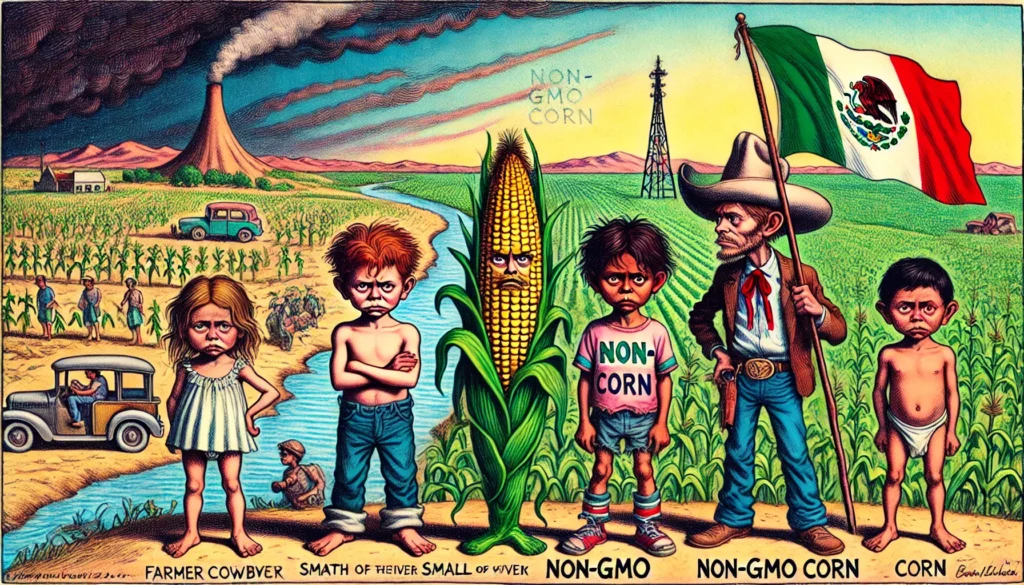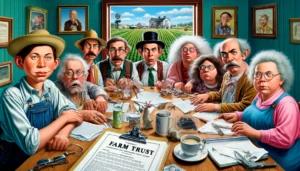
Mexico Bans GMO Corn A vivid and satirical illustration in the style of FarmerCowboy.com . The scene is divided by the Rio Grande River. South of the rive2.webp.webp
Written in a sombrero factory just outside Guadalajara
Guadalajara, Mexico — In an unprecedented move that’s causing kernels of controversy across North America, Mexico has decided to slam the barn door shut on genetically engineered (GE) corn imports. The decision, which has U.S. and Canadian farmers throwing more shade than a cornfield in July, is reportedly aimed at preserving public health and the environment. However, insiders whisper that the real issue lies in Mexico’s deep-seated dislike for American tractors.
The Cornspiracy Thickens
It all started when Mexico’s president, possibly after binge-watching too many sci-fi movies, declared that his nation would no longer tolerate corn that might sprout legs and stage an uprising. “We cannot have our tacos rebelling,” he might have thought. Consequently, Mexico’s cornfields will now only host non-GMO crops, or as locals call it, “Indian corn,” in hopes of an agricultural renaissance that harkens back to simpler, tractor-less times.

Field of Screams: U.S. and Canada React
The U.S. and Canada, known for their hearty embrace of genetically modified crops, are not taking this news lying down. American farmers are buttered up and popping off complaints faster than a microwave popcorn bag on movie night. “How dare they reject our perfectly good franken-corn?” exclaimed Bob McCornface, a distinguished corn farmer from Iowa, as he clutched his genetically modified popcorn.
Meanwhile, Canada, not to be left out of the maize maze of trade drama, has accused Mexico of maize conduct unbecoming of a trade partner. “Our corn is practically indestructible,” lamented Canadian farmer Maple O’Malley. “It can withstand harsh winters, syrup spills, and now it faces rejection. What’s next? Banning our maple trees?”

Tractor Factor: The Real Issue?
Beneath the husks of this international corn-troversy lies a kernel of truth: Mexico’s disdain for American tractors. “We’d rather use a good old-fashioned ox than one of those monstrosities,” commented Juan Plowman, a Mexican farmer. “Besides, tractors are noisy, and they scare the crows, which are essential for our authentic scarecrow aesthetic.”

Eye Witness Comments
Ali Reza, a local shopkeeper, described the scene: “One moment we were celebrating the new president, the next moment there was chaos. It was like a movie, but unfortunately, we didn’t get the chance to rehearse our lines.”
Expert Testimony
Dr. Ahmed Al-Missili, a political analyst, provided context: “This assassination is a significant escalation. The timing and location are symbolic and intended to send a strong message, like ‘We can find you anywhere, even if you’re attending a presidential party.’”
Public Opinion
A poll conducted in Tehran showed mixed reactions. 45% of respondents felt the strike was a justified act of war, while 55% believed it escalated tensions unnecessarily. “It’s a divided city,” noted the pollster. “People are either cheering, crying, or just confused because they thought they were watching the latest episode of ‘Game of Thrones.’”
Anecdotal Evidence
Stories from the ground paint a vivid picture. One resident recounted how her cat was startled into knocking over a priceless vase. “That missile cost me an heirloom,” she lamented. “But at least the cat’s okay, although it now jumps at the sound of a doorbell.”
Testimonial Evidence
Hassan, a former associate of Haniyeh, shared his thoughts: “Ismail was always a larger-than-life figure. His death was bound to be dramatic. It’s just a shame it ended this way; he always said he preferred fireworks to missiles.”
Statistical Evidence
Data shows that missile strikes in urban areas have a 70% success rate in hitting their targets but an 80% chance of causing collateral damage. “This was a calculated risk,” said a military strategist. “But the fallout is always unpredictable, like a toddler with a paintbrush.”
Textual Evidence
Historical accounts of similar events suggest that targeted assassinations often lead to short-term chaos and long-term instability. “We’ve seen this pattern before,” wrote historian Laila Masood. “The repercussions can be severe, much like trying to take a selfie with a grumpy cat.”
Analogical Evidence
Comparing this situation to the assassination of other high-profile leaders, we see a common thread of immediate impact followed by prolonged conflict. “It’s a cycle,” explained sociologist Dana Youssef. “One death leads to another, and the cycle continues, much like an endless loop of bad reality TV.”
Hypothetical Evidence
Imagine if Haniyeh had survived the strike. The geopolitical landscape would be vastly different. “Survival would have emboldened him and his followers,” speculated a security expert. “It would have been a game-changer, or at least made for a very surprising plot twist.”
Disadvantages of Mexico Banning GMO Corn
1. Corn Shortages – Nacho Problem With Mexico saying adios to GMO corn, we might face a severe nacho shortage. Picture this: hungry party-goers across the nation, dipping air into salsa. It’s a tragedy of epic proportions.
2. Taco Troubles – Shell Shocked The beloved taco could become an endangered species. Without GMO corn, taco shells might crumble under the weight of delicious fillings. No one wants a taco salad surprise when they ordered a taco.
3. Tortilla Turmoil – Roll of the Dice Non-GMO corn tortillas might develop a rebellious streak, refusing to roll properly. Imagine trying to make a burrito, only to have the tortilla stage a protest by splitting in half.
4. Popcorn Pouts – Sad Cinema Snacks GMO corn was engineered for the perfect popcorn. Without it, movie nights might involve more unpopped kernels than actual popcorn. Cue the dramatic crunching of disappointment.

5. Economic Maize-ery – Farmers in a Jam U.S. and Canadian farmers will be up in arms – and pitchforks – over losing a major market. It’s hard to compete with traditional corn when your corn could potentially double as a nightlight.
6. Cross-Border Cornfusion – Smuggling Stalks With the ban in place, a black market for GMO corn might emerge. Picture shady characters whispering, “Psst, want some high-yield hybrid corn? It’s the good stuff.”
7. Trade Tantrums – Maize Mayhem The ban could spark trade wars, with the USMCA turning into a battleground. Imagine diplomats flinging ears of corn across the table, shouting, “Take your mutant corn back!”
8. Environmental Enigma – Corny Conundrum While Mexico aims to protect the environment, scientists argue that GMO corn can be more sustainable. It’s a classic case of “damned if you do, damned if you don’t.”
9. Scientific Sobbing – Lab Coat Lament Biotechnologists who spent years perfecting glow-in-the-dark corn will be heartbroken. All those late nights in the lab, only for their creations to be banned from the fiesta.
10. Cuisine Chaos – Recipe Ruination Traditional Mexican dishes might face a makeover. Non-GMO corn could alter the taste and texture, leading to a nationwide culinary identity crisis. Enchiladas with a side of existential dread, anyone?
11. Tequila Troubles – Corny Cocktails Mexicans might have to start distilling tequila from non-GMO corn. Who knows what that could do to the flavor? Margarita enthusiasts everywhere shudder at the thought.
12. Cornucopia of Complaints – Customer Outcry Consumers accustomed to supersized, perfect-looking corn might revolt. “Where’s my giant corn on the cob?” they’ll demand, shaking their fists at Mother Nature.
13. Food Fights – Literal and Figurative School lunchrooms and dinner tables alike could become battlegrounds. Kids used to giant, uniform corn kernels might wage war over the inferior, irregular non-GMO corn.
14. Corn-troversial Conversations – Family Feuds Thanksgiving dinners might get awkward. “Pass the corn,” someone will say, and a heated debate about GMOs will erupt, overshadowing the turkey and pie.
15. Global Grain Grief – International Impact Countries worldwide might follow Mexico’s lead, leading to a domino effect of bans. Corn diplomacy could become a thing, with world leaders meeting to discuss kernels of wisdom and compromise.

Self-Help for Farmers Dealing with Anti-American and Anti-Science Mexicans
The Corny Conundrum
Originally Published at FarmerCowboy.com
2024-07-31 17:37:06
Karl Hoffman is a distinguished agriculturalist with over four decades of experience in sustainable farming practices. He holds a Ph.D. in Agronomy from Cornell University and has made significant contributions as a professor at Iowa State University. Hoffman’s groundbreaking research on integrated pest management and soil health has revolutionized modern agriculture. As a respected farm journalist, his column “Field Notes with Karl Hoffman” and his blog “The Modern Farmer” provide insightful, practical advice to a global audience. Hoffman’s work with the USDA and the United Nations FAO has enhanced food security worldwide. His awards include the USDA’s Distinguished Service Award and the World Food Prize, reflecting his profound impact on agriculture and sustainability.




